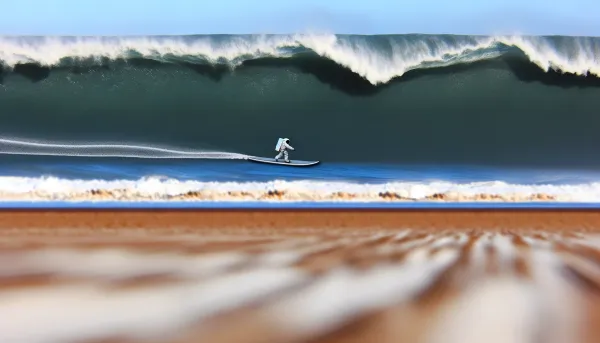The AI effect
Early thoughts on publishing after the robots take over
Munich is about as different from Las Vegas as you can get. It has to be one of the quieter and calmer major cities in the world. I’m beginning to think I might be more European than American. Thanks to DLD for the invite to speak here. This is a great event that brings together people from many different disciplines — topics following me included everything from clean tech to neuroscience to surfing — in a way that makes sense.
I suspect this year will be the year of AI as new tools and uses materialize. This week, I’m taking an early shot at parsing what it will mean for publishing. Would love to hear your feedback. Just hit reply to this email.
Thanks to Impact.com for sponsoring this week. It has a pair of tools worth considering: Pressboard helps publisher content studios more efficiently manage their branded content partnerships, and Trackonomics similarly helps publishers efficiently manage their affiliate programs. .

The AI effect
First, a confession: It isn’t looking good for my optimism that underneath the idiocy of ape JPGs, there was something to the entire web3 thing. I blame too much time in Miami. With that in mind, I think it’s a safer bet to say that artificial intelligence will have a profound impact on the media industry.
Earlier this week, my sister texted me to ask if ChatGPT could be used to write thank you notes. I expect that will become the norm this year, as a flood of new AI-enabled tools and platforms come online, particularly those using large language models to produce text and images. Generative AI is a holy-shit technology. When you use it the first time, you end up thinking this is going to change a whole bunch of things.
And as someone who has made a living arranging words in a certain order, I understand the qualms many have. I have no desire for some berserk AI to turn us all into paper clips while trying to conserve energy. That would suck. And as a confirmed member of the laptop class, I tend to worry more about automation tools that replace so-called knowledge work versus when machines replace assembly and manual labor. Go figure.
I tend to view technological advances as inevitable. The degrowth movement is dumb because it is simply not possible for us to do as a species. We got this far by using technology to better our lot, and we’re going to continue to do that. I mean, we split the atom, so AI is coming. The impacts it could have across the economy and society are mind-boggling, so it’s best to confine this to early thoughts on how AI will alter media. This is a work in progress, so bear with me…
RIP the link. The open web hasn’t fared well in recent years as platforms and apps have taken over. The rise of AI should further the demise of the open web. On the latest episode of People vs Algorithms (you should check out this podcast, btw), we discussed the implications of the demise of the link as a main way of navigating as well as a signal of authority.
AI will further level the playing field. The creator economy is likely overblown, but there is an undeniable shift that continues to take place from institutions to individuals. AI tools can provide the productivity boosts that make it more likely smaller groups can compete with larger incumbents. Used correctly, this can “scale” a human.
Advertising and marketing copy will go first. AI will likely have a big impact on scaling creative assets, both copy and images. This is a job most likely done better by robots. Many early AI tools, including Jaspar and Copy.ai, are focused on advertising. The tools will get better as they can be trained in a specific style as opposed to a generic, one-size-fits all approach. And, of course, AI is already being used in advertising stunts.
Search is going to be a mess. I’m in Germany now, speaking to a group of magazine publishers. One of the first issues that was raised was whether ChatGPT and the like will end up flooding search engines with “service content” that is the bread and butter of many sites’ SEO strategies. Few publications get a sizable chunk of their traffic from direct channels. Search is the largest single source of traffic for most publications. And many have teams to feed content to the algorithmic gods. That’s going to get a lot harder. Already Microsoft has plans to integrate ChatGPT with Bing, upstart search engine Neeva has AI in its results and Google has declared a “code red” to figure out its response. (It helps that Google made a $500 million bet on Deepmind in 2104.) Already CNET is experimenting with using AI to produce some of that content. The big question is how Google ranks such synthetic content.
Humanity will be more valuable. It’s natural for all of us to believe what we do is so special it cannot be replaced by a bot. That’s true to an extent. AI will displace a lot of work that’s mundane communication. It will end up putting a premium on the human connection. We’re hard wired to trust humans more than machines. There’s a reason we tend to get far more frustrated trapped in a loop with automated customer service. Publishers that have both human connections and the ability to convene a community will be far more valuable.
A golden age of reporting. AI can do summarization very well. And the crypto crowd will argue that it will end up doing a better job of reporting as more information is verified and available “on chain.” Maybe. The more likely scenario is that AI makes data journalism embedded in all reporting – and the reporters who can do deep reporting work finding out things others don’t know will still be needed and valuable. AI-assisted reporting is set to be an emerging field.

Dead link alert
If you’re anything like your peers, you’re likely contributing to the industry’s $5.5M loss to link rot on a monthly basis. Stop struggling to keep up with broken and out-of-stock links this year – try Trackonomics by impact.com’s Link Scanner to start identifying where you’re losing revenue.
Claim your 25 free link scans today to see how you can save thousands of dollars in commissions every month.

Recommendations
The solo personal publishers – let’s not say creators – that achieve escape velocity have several expansion options. One is to use their personal following to expand into a larger brand with other collaborators. The other is to go deeper within their own brand by adding new services. Both Packy McCormick and Litquidity are taking the latter route. Packy is launching the third iteration of his rolling fund, aiming to raise $30 million for investments. Litquidity is getting into headhunting with a partnership with financial services recruiting firm Whitney Partners to create Litney Partners as a way to attract young talent drawn to Lit’s meme game. Once you have distribution and a following, you have many ways to build a business, particularly in high-value areas like investing and finance.
Recession Watch: Reach in the UK is cutting 200 positions as it struggles with decreased ad revenue and higher costs. (Inflation in the UK is hovering at 10%.) A particular pinch in Europe in particular is the skyrocketing costs of print. Reach is focused on getting more efficient, including cost savings from “simplification of central support functions, supply chain efficiencies in print and distribution, and accelerated removal of editorial duplication.”
The dynamics of Substack publishing are different than other media. The personal nature of the newsletter format (and podcast) incentivizes writers, for good and maybe bad, to be more themselves. As one writer put it to The New Statesman, “the more you it is, the better.”
It’s very on brand that crypto media is a wild place. Several publications are backed by those with “skin in the game,” creating all kinds of conflicts. The Block lost its CEO after its secret ties to Sam Bankman-Fried were revealed. Meanwhile the leading crypto publication, Coindesk, is in the position of reporting on the travails of its owner, Digital Currency Group, which is being hit with lawsuits.
Branded content campaigns are always a balance between content the audience will find appealing and performance the client wants. Pressboard has gathered together a database of over 500 of the best performing branded content campaigns from around the world. See 2022’s top partnerships. (Sponsored)

Thanks for reading. Please hit reply with feedback or send me a note at bmorrissey@therebooting.com.
For sponsorship information, see The Rebooting media kit and get in touch.




